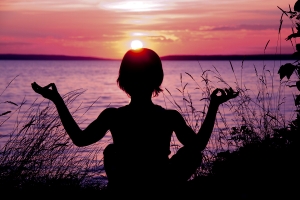 Yelling “Fire” in a crowded theater can get you into trouble. So can saying “Yoga” in a group of Catholics.
Yelling “Fire” in a crowded theater can get you into trouble. So can saying “Yoga” in a group of Catholics.
I just do it for the stretches, I don’t do anything religious.
It’s evil…the work of the devil
Oh please! The next thing you’ll be telling me is the number 13 brings bad luck.
Practicing Yoga breaks the first commandment; it’s pagan worship.
And so it goes. And goes. And goes. Three years ago, I did an article titled “To Yoga or Not to Yoga.” Initially, I wrote it, and then put it aside for around a year, not sure I was up for putting my head into a hornet’s nest. When the time seemed right, I posted it. The hornets came. So did a number of radio interviews in which the listener lines lit up the whole time. “Can you stay on for another half hour,” I was asked by host Drew Mariani at Relevant Radio. “This happens every time we talk about yoga.”
Why the Controversy?
There are a lot of issues that come with controversy—contraception, supposed same-sex marriage, and abortion, being among them. The difference is that the Church has spoken definitely on those issues. People can agree or disagree with the Catholic Church but they cannot pretend the Church is in favor of any of those issues. With Yoga, interpretations abound. Many Catholics and clerics come down strongly against participating in yoga while others might even host a yoga class at a Catholic school or church. Debates can get heated, with both sides convince that Yoga for exercise is either harmless or evil.
In a definition from About.com, Yoga is described as, “…a disciplined path for purification of our attachments to the temporal world of form (bodies and objects) and the ever changing world of energy and mind, to experience the bliss and unity of consciousness as the unchanging, ever permanent, immortal and infinite Being.” Wow. Cool. Wait, what’s that about the immortal and infinite Being? Is that God? Or the devil? Or is it nothing if I just show up with a mat and stretch pants ready to limber up?
Just the Exercise
Yoga is considered a whole body experience originating in Hinduism as a means to reach enlightenment through exercises and meditations that unite the body, mind, and spirit. For Catholics, worshiping or becoming one with a Yoga deity breaks the First Commandment. No one argues that point. The question is, can we claim to just be there in pursuit of physical fitness alone?
Hatha yoga, the one used in exercise classes, prepares the body for enlightenment through physical postures. Some people say they don’t participate in the meditations or postures that could be religious. After all, if an atheist folds his hands, he’s not praying. So if a yoga posture used for worship means nothing but a balance exercise to you, then is that all it is?
Putting your body into a particular posture does not automatically turn it into a form of worship. But what if that is the purpose of the pose as many of the yoga postures are? Can you remain neutral even if the instructor is not? Isn’t the intent of the person what matters most?
The Problem with Yoga
The controversy with yoga goes beyond a person’s intent. No one is accusing Catholics of going to yoga class specifically to worship a Hindu God. The problem is that yoga holds that all existence is one; there is no distinction between God and the university. Through enlightenment a person becomes one with all of existence.
Having taken a yoga class myself, many years ago, I know that the stretches, relaxation meditations and poses, all mesh together. It would be hard to discern the instructor’s meaning behind everything. For instance, a classic yoga mantra: “So’ham” means, ‘I am the universal Self,’” which is often used repetitively, timed with your breathing.
A friend who took a yoga class told me everyone was supposed to fold their hands and bow before they began. She said she did not do that but upon considering that yoga exercise is one part of a bigger pagan spiritual practice, she decided to quit. “Why take a chance?” she said. “If parts of it are wrong, then I’m not going to participate in any of it.”
In part 1 of the 3 part series: What is Yoga? A Catholic Perspective Fr. Ezra Sullivan O.P., a Dominican Friar of the Province of St. Joseph pointed out that one indication of yoga’s spiritual nature even in exercise classes is the way it affects practitioners over time. “The International Journal of Yoga published the results of a national survey in Australia. Physical postures (asana) comprised about 60% of the yoga they practiced; 40% was relaxation (savasana), breathing techniques (pranayama), meditation, and instruction. The survey showed very significant results: although most respondents commonly began yoga for reasons of physical health, they usually continued it for reasons of spirituality.
“In addition, the more people practiced yoga, the more likely they were to decrease their adherence to Christianity and the more likely they were to adhere to non-religious spirituality and Buddhism. In other words, whatever their intentions may have been, many people experience yoga as a gateway to a spirituality disconnected from Christ.”
Regardless of the warnings or information, there are always Catholics who say they will not give up their yoga because it makes them feel good and they personally don’t use it for religion. But there is a further consideration with yoga. By participating in yoga, or when a school or church sponsors classes, it gives the message of blanket approval. If yoga is okay with the Church or with Sally Stretchy, then it’s obviously okay, is the impression. So, if just part of it is wrong, is it still okay to practice some of it? What do you think?
Copyright 2014 Patti Maguire Armstrong
About the Author

Patti Maguire Armstrong
Patti Maguire Armstrong is an award-winning journalist and author, managing editor and co-author of bestselling Amazing Grace Series. Her latest books are Dear God, I Don't Get It, Dear God, You Can't Be Serious!, What Would Monica Do?, and Holy Hacks. Patti worked in social work and public administration before freelance writing while she and Mark raised their 10 children. Twitter: @PattiArmstrong; blogs at PattiMaguireArmstrong.com


.png?width=1806&height=731&name=CatholicMom_hcfm_logo1_pos_871c_2728c%20(002).png)
Comments